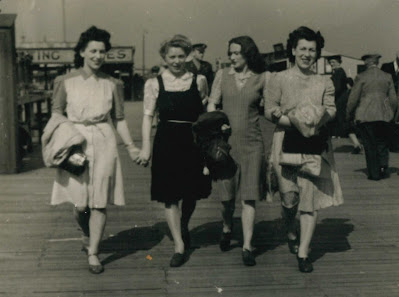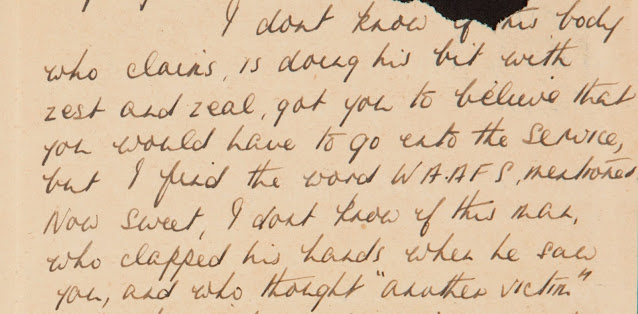Our Collections Volunteer Sue has recently transcribed a collection of over 40 letters from the Second World War.
She uncovered a beautiful story of love and resilience during very difficult times.
Read on as Sue pieces the letters together to tell the story of Jack and Marie.
Read on as Sue pieces the letters together to tell the story of Jack and Marie.
 |
| We believe Jack is the man in uniform, and Marie is the woman to his right |
Introducing Jack and Marie
They got married in May 1939, and moved into a house together on the Lupset Estate in 1940. This estate was developed by Wakefield Corporation in the 1920-30s.
At the time it was much admired as the largest local government housing scheme in Europe. Jack and Marie were very proud of their home.
 |
| The Lupset Estate in the 1930s - photo copyright of Wakefield Libraries |
Their married bliss was soon interrupted by the outbreak of war. In May 1941 Jack was called up. He trained in North Wales and was posted to the Middle East.
Jack was homesick and missed Marie very much. He wrote to her every weekend, sometimes more often. Marie kept his letters.
In 2016 Wakefield Museums and Castles purchased a collection of over 40 letters written between 1941 and 1943.
These were Jack's letters to Marie, lovingly kept.
We don't have Marie's responses, but we can learn a lot about what she must have been telling Jack about life back home in wartime Wakefield from his letters.
Jack's letters
Like all wartime letters, Jack's were censored. They contained little information about locations and manoeuvres in case they fell into enemy hands.However, this isn’t what Jack wanted to write home about anyway!
Much of each letter was taken up with reminiscences of his life with Marie in Wakefield, and how much he loved her and was missing her.
On the first anniversary of his call up he wrote a moving description of the morning he left her, echoing the experiences of many a conscript:
On the first anniversary of his call up he wrote a moving description of the morning he left her, echoing the experiences of many a conscript:
"It tells me that almost twelve months ago, months of pain suspence [sic] and darkness, I had the utter misfortune to be ripped from the arms of a girl in a million."Jack’s letters contain fascinating snippets about his life in the army.
His replies to Marie’s letters also talk to the living conditions and cultural attitudes of 1940s Wakefield.
Life in the army
In August 1941, soon after arriving in the Middle East, Jack was injured in an accident. He broke his toe, which failed to mend properly causing him to limp slightly. Because of this he was rated ‘unfit to serve’ at the front, where he would have earned promotion. Instead, he had to settle for a more mundane (but much safer) post behind the lines.Jack was assigned to duties in the stores, collecting, stocking and distributing uniforms, ammunition, and other equipment. He also opened and ran a canteen which also acted as a shop.
The horrors, death and destruction of the Second World War are rightfully widely reported.
Jack's letters give detailed insight into another, sometimes overlooked element - the sheer 'monotony' of war:
"Don't think that life in the service is a cure for monotony, because frankly I didn't think it was possible to bump into so much boredom."
Some of Jack's letters suggest he was a bit fed up with his life in the army. He and his fellow soldiers were at the beck and call of their senior officers.
His letters record the following unenviable tasks:
- They were required to thoroughly spring clean their billet each week, making a special effort before a visit by a VIP;
- One time they were marched to the beach for a 'dip in the ocean' at 6 in the morning
- They were sent without notice on a long journey on Boxing Day 1942, hangovers notwithstanding;
- Another time, Jack was left to mind the stores for 3 days and nights, with a long to-do list, while the Quartermaster was away.
High points included visits to the cinema – Jack recommends several popular favourites to Marie, and especially enjoyed watching Carmen Miranda in ‘Weekend in Havana’. He also fondly records trips down-town with his mates Montey and Kenny.
The height of joy was the arrival of the post - especially when it
contained a letter from Marie.
Frequent delays in the erratic postal service
were much bemoaned, and Jack began keeping a (handwritten) spreadsheet to
record the despatch and arrival times of their letters.
Looking after family - from afar
Jack would have dearly loved to go home on leave.However, when he was given a precious week off in October 1942, he used it to go and find his brother Harry who was stationed not far away:
"I am making an all out, all in bid to locate our Harry, whom you will know by now, that he is only about 50 miles from here.
He told me in his last letter that he could fix me up with a bed and some food so in that line I have nothing to fear, the biggest proposition being, getting there, it will mean hitch hiking, as there is no bus service."Jack was sending part of his army pay home to Marie to support her.
He was careful with his money and didn’t draw much of his pay, leaving 10 shillings (50p) a week to accumulate against “a rainy day”.
While he was in hospital in 1941 his pay was docked to 1/3 (6p) a day, or 8/9 (44p) per week. In September 1942, he discovered that, although he had resumed full duties in March, the army was still paying him the reduced rate. They restored his back pay but underestimated the amount he had saved, so he no longer trusted the army to look after his money.
He arranged to send £10 from his savings to Marie, plus some of his back pay.
By April 1943 his pay had risen to 6/4 (32p) a day, of which he sent around half home to Marie.The Middle East
Jack generally did not enjoy his living conditions in the Middle East.Mosquitos were a constant problem, and he also met scorpions, ‘great big’ spiders and ants. The climate could be very hot with endless blue skies, or surprisingly cold with storms, wind and even snow. The desert had “blinding dust”.
Despite this, he clearly appreciated being billeted next to the “beautiful blue Mediterranean [Sea]”.
"As I look to my right I have in front of me the Mediterranean Sea looking dark, oily, and full of mystery. What a great change this sea provides, it was yesterday that a few of us boys, remarked how beautiful this sea looked.
The sun was beating down onto the almost stagnant surface, transforming into a bed of myriad coloured diamonds..."
He also writes that “I thought Palestine was beautiful in parts, but honestly I take my hat off to the scenery [Syria] can produce.”
Olive groves, pomegranate trees, banana plants and especially date palms all produced magnificent fruit which was piled up in the local shops and sold very cheaply.
He noted the poverty – people going out without socks or shoes in the cold and rain, when boots cost £2/10/- (£2.50) and a man’s wages were just 3s 4d (17p) a day. Infrastructure was sadly lacking and there was no public transport.
There were a wide variety of shops, from ones selling jewellery, clothes and handbags, to those selling ice cream and ‘excellent’ rice puddings. At one point Jack says he wants to buy Marie some jewellery, but doesn’t know which to get her.
After the first year Jack started taking Arabic lessons and could chat with the boys in town.
Marie's story - back home in Wakefield
Jack comments frequently in reply to the news Marie sends to him. Through this we can learn about Marie’s life in wartime Wakefield.By winter 1942 she was unfortunately in poor health and struggling financially. She moves back in with her parents for a spell. She lost her job, but in February 1943 she got a new job at Clayton Hospital.
Marie also took in lodgers, including a family from London with whom she became very friendly.
She was good friends with her neighbours on either side, Mary and Vi, and a photo found with the letters show a group of 4 girls on a day out at the seaside:
 |
| Marie (we think she's second from the left) with her friends at the seaside |
From the letters we also get glimpses of their life together before the war. Jack worked as a painter and decorator, like Marie’s brother Harold.
Maybe this was how they met?
Until January 1943 Marie was working at Webster Bros. This may have been in the grocery store on the corner of Cheapside and Westgate, which had a pie shop above, or possibly in the café in Cross Square.
Until January 1943 Marie was working at Webster Bros. This may have been in the grocery store on the corner of Cheapside and Westgate, which had a pie shop above, or possibly in the café in Cross Square.
After she lost her job, Marie almost signed up to the Women’s Auxiliary Air Force (WAAF). She told Jack that she had been challenged by a recruiter who accused her of occupying a “hiding place” and told her that if she didn’t volunteer she would be forced into the service.
Jack was horrified. His reply to her reassured her that this was untrue, and pleaded with her not to become “another victim”:
"I don't know of this body who claims, is doing his bit with zest and zeal, got you to believe that you would have to go into the service, but I find the word W.A.A.F.S mentioned. Now sweet, I don't know of this man, who clapped his hands when he saw you, and who thought "another victim" "In reality, Marie seems very resilient. Like many women, she took advantage of the opportunity the war presented to assert some independence. She went out to work despite some reservations from Jack.
She took the initiative in writing about her difficulties in dealing with their long separation, which Jack then echoed.
Jack was particularly keen to hear news about what family and friends were up to.
He was dismayed at the way the “wicked war” had deeply affected his younger brother Albert:
"It's a bad show Marie, I don't know, life in the service seems to have an uncanny way of pulling a chap down like this..."
Jack even tried match-making between Albert and Marie’s friend Mary from afar!
After the war
Thankfully for this story, there was a happy ending.Jack returned home to Marie when the war ended. Sometime in the mid-1950s they moved from the Lupset estate but appear to have stayed in the Wakefield area. No children have been traced.
They stayed together and grew old together.
They stayed together and grew old together.
Jack died in 2002 aged 89, and Marie in 2011 aged 94.
We'll let Jack sign off:
Looking for more local wartime stories?









What a beautiful story it shows that war can not come between you and the one you love. It is a pity that it appears there were no children,children that would have been proud to have parents like Jack and Marie.I was so glad that they had a long and happy life together.
ReplyDelete